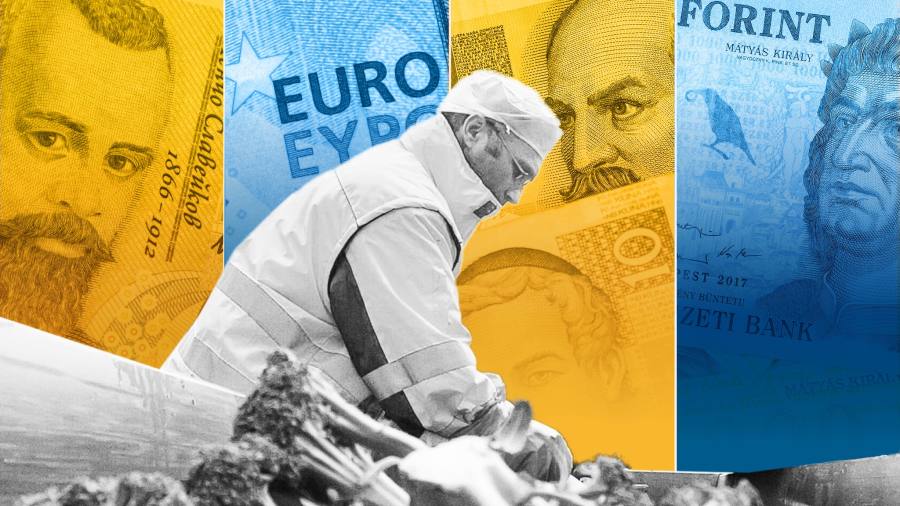Receive free Corporation tax updates
We’ll send you a myFT Daily Digest email rounding up the latest Corporation tax news every morning.
European governments are increasingly turning to windfall taxes to balance their books and tackle public uproar over companies making high profits during the worst cost of living crisis in decades.
The Italian government’s surprise levy on banks on August 8 was the latest example of a trend that began when power prices surged in the wake of Russia’s invasion of Ukraine, delivering bumper revenues to energy companies.
The taxes were originally imposed on the energy industry. But they are increasingly spreading to other sectors as politicians, hit by the rise in interest rates and higher government spending, seek to plug budget deficits.
“We’ve got this European wave of windfall taxes and that’s clearly in response to revenue shortfalls in government,” said Grant Wardell-Johnson, head of global tax policy at KPMG.
Data from KPMG and the Tax Foundation show that more than 30 windfall taxes, several of which now cover multiple sectors, have been introduced or proposed across Europe since the start of 2022.
A total of 24 EU countries have announced, proposed or implemented a windfall tax on energy companies, which European Commission officials put forward after energy prices soared at the start of 2022. The UK has also imposed a levy on profits made from the extraction of oil and gas from the North Sea.
But banks have increasingly become a target, with the Czech Republic, Lithuania, Spain and now Italy imposing charges on the sector. Latvia could follow.
In other countries, the sectors covered by windfall taxes have become even more widespread. Hungary has imposed levies on all financial institutions, including insurance companies, as well as pharmaceutical groups. Portugal introduced a 33 per cent levy on food distributors with excess profits generated in 2022 and 2023.
Croatia has gone further still, introducing a windfall tax that potentially applies to all companies that report a revenue above K300mn (€40mn) for 2022. Bulgaria is also planning an economy-wide windfall tax.
Some industry experts have criticised governments for increasingly resorting to windfall taxes, with one adviser telling the Financial Times that the levies were generally “an admission of policy failure” and risked deterring future investment.
Cristina Enache, global tax economist at the Tax Foundation, a US think-tank, said such measures “would penalise domestic production and punitively target certain industries without a sound tax base”.
While the original EU-wide “solidarity contribution” from energy companies was set to run only until December 2023, countries including Spain, Slovakia, Hungary and the Czech Republic plan to levy them into 2024 and in some cases 2025. The UK’s levy is legislated to end in March 2028.
However, tax justice campaigners say governments are right to tax companies making record profits at a time when the rise in the cost of essentials such as power and food has left many people struggling financially.
“Windfall taxes appeal because they’re intuitively fair,” said Christian Hallum, tax justice policy lead at Oxfam. “We have a situation where millions of people are facing hardship and many corporations are making record profits. It’s simply not fair.”
The IMF has also argued in favour of levies on excess profits becoming a permanent feature of the tax system.
“[This] is superior to relying on ex-post one-off windfall taxes on particular firms or sectors,” said Shafik Hebous, deputy division chief of the IMF’s fiscal affairs department.
Others in the industry agree that the shift in the economic climate has led to governments increasingly viewing windfall taxes as a viable option to raise revenues.
“What the pandemic did — apart from give rise to the need for cash for governments — was it produced winners and losers,” said Wardell-Johnson. “A windfall tax is much more attractive in that environment. As, if you were to raise taxes across the board, it would have a lot of economic damage.”
Before the outbreak of war in Ukraine, such taxes had not been widely used in decades. The levies were first introduced over a century ago in Europe during the first world war.
In 1915, Denmark introduced the Gulasch tax, named after the German stew, on Danish food exporters that continued to trade with Germany during the war. At least 22 countries, including the UK, US, France, Italy and Germany, adopted some form of extra tax on “excess” corporate profits during the conflict. The second world war also saw the use of windfall taxes by the UK, Canada and the US.
Other more recent examples include a windfall tax on crude oil enacted by the US government in 1980 and a 1981 one-off bank levy introduced by Margaret Thatcher’s British government. The UK’s Labour government also brought in a windfall tax on utilities in 1997, arguing that the previous Conservative government had sold off the companies cheaply.
Read the full article here




